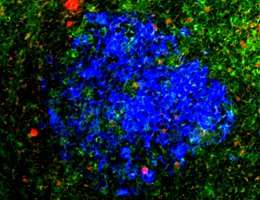Modulating immune responses

The protein Roquin plays a key role in the regulation of immune reactions. LMU researchers have now uncovered details of the mechanism by which it controls the function of regulatory T cells in the adaptive arm of the immune system.
The RNA-binding protein Roquin plays a central role in the regulation of the immune system. Among other things, it orchestrates the activation and differentiation of T cells, and prevents immune responses from overshooting. Consequently, loss of Roquin is associated with autoimmune and auto-inflammatory disorders. Detailed knowledge of Roquin's functions is therefore vital for a full understanding of the pathogenesis of these conditions. LMU immunologist Vigo Heissmeyer and his research group have used a genetic method to selectively inactivate Roquin in a specific subset of T cells. This strategy enabled them to uncover a complex mode of action of Roquin within different subsets of T cells and during different immune responses. Their findings appear in the journal Immunity.
In collaboration with researchers at the LMU, the Helmholtz Zentrum München, the University of Basel and the Helmholtz Zentrum in Braunschweig, Heissmeyer's team studied a strain of mice in which the gene for Roquin has been deleted specifically in so-called regulatory T cells (Tregs). "To our surprise, we found that the level of T cell activation in these mice is almost as high as in mice lacking the protein in all types of T cells," Heissmeyer says. "This implies that Roquin function in Tregs is primarily responsible for its effect on T cell activation." The function of Tregs, as their name suggests, is to ensure that immune reactions do not get out of hand. They do this in two complementary ways.
First, they inhibit the activation of resting ("naïve") T cells. Secondly, they repress the function of already activated T cells. For example, in the follicles of the lymph nodes, they interfere with the functional interaction of activated follicular T helper cells and B cells, which is required for the production of antibodies by the B cell. In order to perform the latter function, a proportion of Treg cells differentiates into follicular regulatory T cells (Tfr), which migrate into the germinal centers of the lymphoid follicles. In the absence of Roquin, too many Tregs implement this differentiation program resulting in the generation of abnormally large numbers of Tfr cells. "This imbalance may compromise other Treg functions ," Heissmeyer explains. Thus, the fact that so many Tregs are localized to the germinal centers (in the form of differentiated Tfr cells) probably makes it impossible for them to fulfill their normal role in keeping naive T cells in a quiescent state. As a result, larger numbers of the latter are activated and differentiate into T helper cells, which then stimulate other, B cell-independent immune reactions.
When Roquin is lacking, the ability of Tregs to control the course of immune reactions is therefore perturbed in two ways. : Treg-mediated inhibition of immune responses outside the germinal center is reduced, however, Tfr-mediated inhibition of antibody production within the germinal centers is enhanced. "We then looked at the consequences of the loss of Roquin at the molecular level. On the basis of comparative, genome-wide analyses of mRNA expression, we were able to show that Roquin acts as an inhibitor at several points within a specific signaling pathway, which is essential to control the metabolism of cells. In this highly complex fashion, it also acts in Tregs to enable them to modulate the fates and function of cells required for diverse immune reactions," says Katharina Essig, first-author of the publication. According to the authors, the new study not only elucidates how Roquin prevents immune responses from running out of control, it also opens up new perspectives on targeting Roquin in the treatment of diseases resulting from deregulation of the adaptive immune system.
More information: Katharina Essig et al. Roquin Suppresses the PI3K-mTOR Signaling Pathway to Inhibit T Helper Cell Differentiation and Conversion of Treg to Tfr Cells, Immunity (2017). DOI: 10.1016/j.immuni.2017.11.008

















